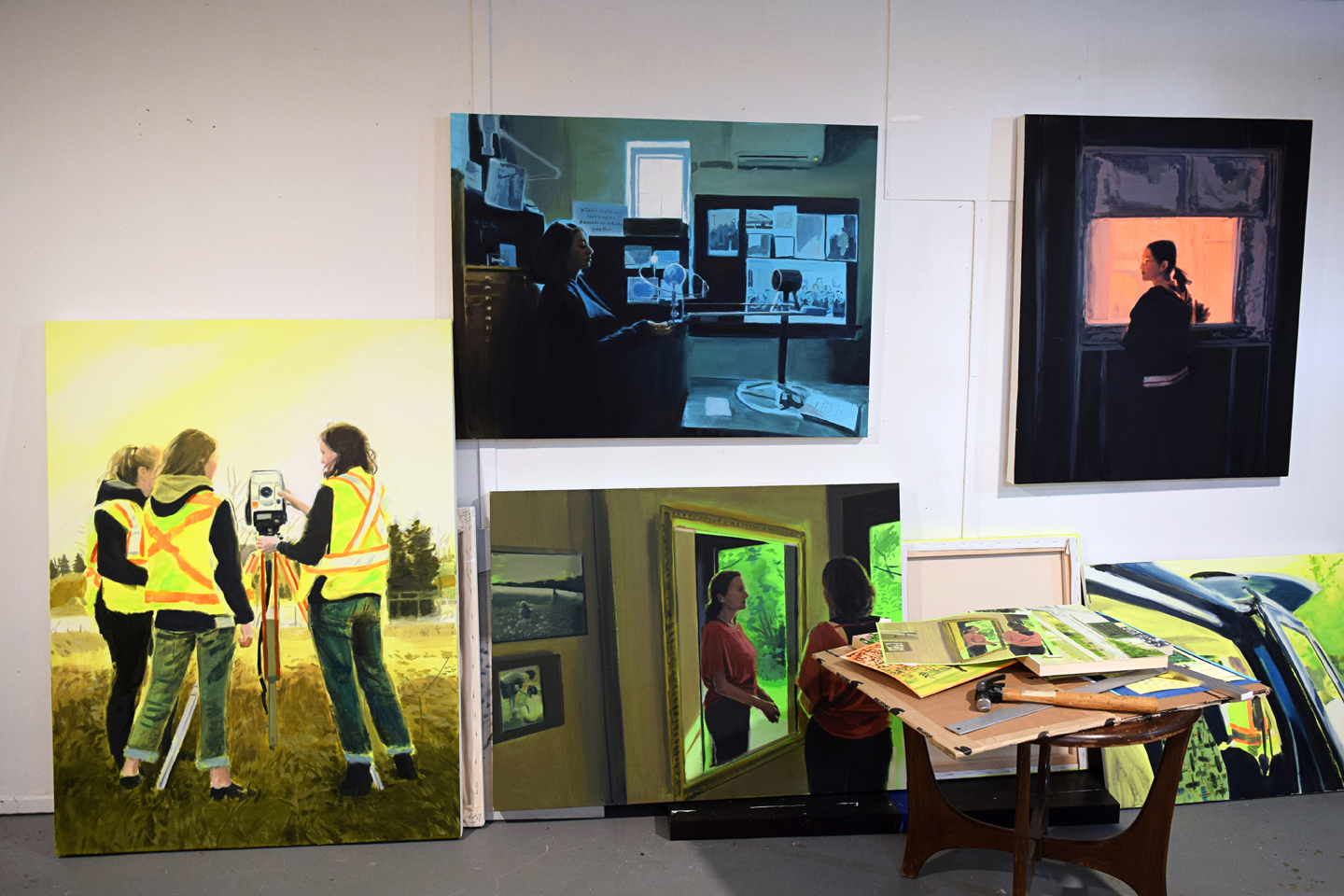Posted: 27 April 2020
Amanda Rhodenizer was born in Bridgewater, Nova Scotia, and is currently based in Waterloo. She holds a BFA from the Nova Scotia College of Art and Design (2006) and an MFA from the University of Waterloo (2014). Her work has been included in exhibitions at the Art Gallery of Nova Scotia, the Orillia Museum of Art & History, Montréal’s Art Mûr, and the Kitchener-Waterloo Art Gallery, where she debuted a new series of paintings, Casual Frontier, in our summer 2018 exhibition, The Brain is wider than the Sky. The titular painting in that series was later purchased by KWAG for our Permanent Collection.
Shortly after her exhibition at KWAG, Rhodenizer put out a call for women and non-binary individuals working in STEM fields to serve as models for a new series of paintings. We have been eagerly watching her progress via her Instagram posts since she started sharing her first sketches for this project, and were curious to find out how her new paintings – works that document occupations on the front lines of this pandemic – were shaping up during this time of isolation.
Have the circumstances of isolation impacted the work you’re making?
I would say that yes, the work has been impacted our need to stay isolated. Mainly due to the fact that we have two young children who are home from school and daycare, which greatly limits the amount of time that I can work in my studio. My partner and I tried to develop a routine, taking alternate afternoons to do some work, or read, or just take time for ourselves which helps break up the monotony. I feel lucky in that my studio is in my house, and I can sneak in an hour or two of work in the evenings or during naptime, as well.
Isolation has also caused quite a domino effect in terms of cancelations of studio meetings, complicating collaborations, and throwing everything into uncertainty... of course, we're all wondering what the long-term changes to the art world will be, but I am encouraged when I remember that painting has gone through many evolutions and will continue to adapt to our changing world.
Are there significant changes in your way of working that have made creativity more challenging? How are you adapting?
The time factor is definitely my biggest challenge at the moment. In my regular (pre-COVID) life, I stick pretty closely to my daytime work schedule – those school and daycare hours are just so precious – so facing my new reality of doing kid's stuff all day, every day (or every other day) for the foreseeable future feels really heavy.
One silver lining is that my oldest has just started to visit me downstairs in my studio when I'm working. Apart from being totally freaked out by the possibility of spiders, he seems interested in seeing what I'm up to. Last week I set him up with some paint of his own and he started to make his own pictures, which was nice to see. He has also helped me gesso a couple canvases, so I guess I've managed to get a new studio assistant out of all this!

What do you hope to receive by sharing your work with others? What do you hope they receive from your sharing?
One of the main reasons I feel so compelled to keep going with this series is because of the critical roles that women and non-binary frontline workers are occupying right now during this pandemic. I hope that by sharing this work with others, that they might be able to consider the contributions of women and gender non-conforming folks in relation to STEM fields, the Canadian landscape and its colonial legacy, and the importance of these professions as they bravely help us confront new realities.
In what other ways are you cultivating care in your life? What comforts you?
I'm enjoying planning this year's garden with my family, and taking time to accomplish little things around the house that weren't ever high-priority. I've started to read a little bit again, just for enjoyment and not for research, and so I'm taking a long time reading each and every word in this Alistair MacLeod book, Island: The Collected Stories – his slow descriptions of people, rooms, and objects are the perfect antidote to news-cycle speak.
